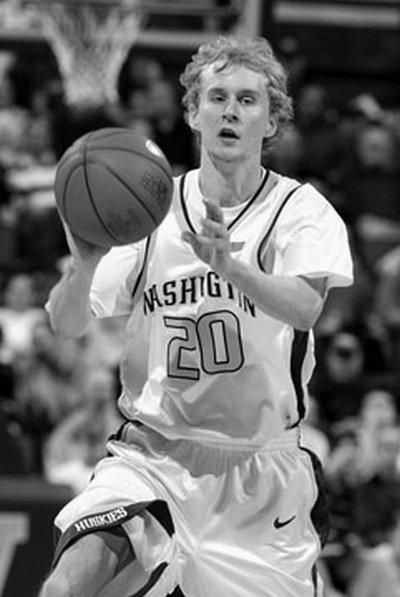August 16, 2007
Of basketball and Socrates
When the Husky men’s basketball team heads to Greece Aug. 27 for a series of exhibition games, they’ll be traveling with Socrates. That’s because in their off-court time, they’ll take part in a classics class that focuses on the man who is often called the father of western philosophy.
James Clauss, former chair of classics and incoming director of the Honors Program, will be teaching the class, which begins before the team’s departure and will continue intermittently through fall quarter after its return. Team members will accumulate enough class hours by the time they get back to earn five hours of credit, Clauss said, but he wants to meet with them occasionally through fall in order to help them put the experience into context.
Clauss said the team will become familiar with Socrates through reading several dialogues written by the philosopher’s student, Plato, and a play written by Aristophanes (Socrates himself published no writing). They’ll also learn to employ Socratic dialogue in class discussions.
“I hope they’ll get a sense of who Socrates was as a person,” Clauss said. “Then when we get to Greece, we will visit sites that were important in his life, such as the the Royal Stoa in the agora where he met Euthyphro and had one of his famous dialogues, and the prison where he died.”
Clauss will also teach Greek history and architecture, and accompany the team on its tours of important archaeological sites.
Intercollegiate Athletics has wanted to offer classes like this one in conjunction with trips for some time, said Kim Durand, associate athletic director for student development. “A lot of our teams get the opportunity to do international trips, and we thought it would be so great to add an educational component.”
She called the women’s volleyball team’s trip to China in 2005 a missed opportunity. “It would have added so much if we had done a better job preparing them by teaching them about the culture and history of the country they were visiting,” she said.
The department has known about the trip to Greece for about a year, which gave staffers time to make a plan. Durand approached Ed Taylor, vice provost and dean of undergraduate academic affairs, to ask how she might find a professor with the appropriate expertise. Taylor immediately thought of Clauss, who not only knows the material, but also has led study abroad programs before.
“Jim (Clauss) responded enthusiastically and started preparing a class that would fit into the time frame,” Durand said. “The coaches were really on board with the idea too.”
The team will be in Greece until Sept. 6, visiting at least three cities and playing four or five games (plans aren’t yet finalized). The Classics Department and Undergraduate Academic Affairs are contributing funding along with Intercollegiate Athletics to make the class possible.
Students will be required to keep a journal and to write several essays discussing the effect the trip has had on them. But their most unusual assignment will come in the middle of fall quarter, when they pair off and begin engaging in Socratic dialogues — using instant messaging — on a subject that must be approved by Clauss. Clauss said he’s tried this himself and it isn’t easy. “It’s not like having a face-to-face conversation that can easily go off topic,” he said. “You have to stay focused to keep the dialogue moving forward.”
At the end of the dialogue the athletes will have to print out and clean up what they’ve written, then turn it in as a paper.
Clauss said he has never taught an entire class of male athletes before. “They’re under so much pressure, I can’t imagine what it will be like with all that testosterone in the room,” he said. “But I’m counting on my man Socrates to pull us through”


